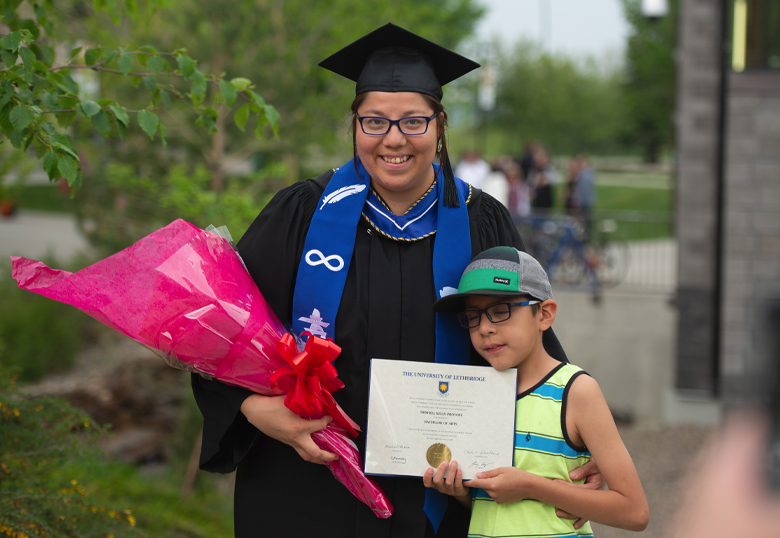A positive trend has been developing at the University of Lethbridge as more and more Indigenous students are earning post-secondary degrees, culminating with a record 98 graduates crossing the stage at the 2021/22 convocation ceremonies.

Nestled in the heart of Blackfoot Territory, ULethbridge has long nurtured its relationship with the Indigenous communities of southern Alberta and in 1975 established one of Canada’s first Departments of Native American Studies. In recent years, the University made it a strategic initiative to advance learning options and supports for Indigenous students through a variety of programs.
“When you see the number of Indigenous students who are finding success and completing their academic careers consistently increase, there is intentionality behind it,” says Dr. Mike Mahon, president and vice-chancellor.
Over the last decade, the University has graduated, on average, 50 to 75 self-declared Indigenous students between the spring and fall convocation ceremonies. In the last three academic years, those numbers have shot up to 87, 84 and 99 students respectively. The roots of that growth can be traced.
In 2011, Mahon asked Roy Weasel Fat, then Red Crow Community College vice-president (academic), and ULethbridge faculty members Drs. Leroy Little Bear (BASc (BA) ’72, DASc ’04) and Jane O'Dea to create a strategy to support Indigenous students, faculty, staff and community members. The seven recommendations they submitted set a course of action and elicited a pledge from Mahon.
“We will place greater focus on recruiting and retaining Blackfoot and other First Nations, Métis, and Inuit students, the fastest growing young adult population in Canada,” said Mahon at the time. “However, enrolment is not the only reason to focus on this population. Creating opportunity and an inclusive campus environment for all students is simply the right thing to do.”
The establishment of the Iniskim Education Committee followed in 2013, and in 2014, a Memorandum of Understanding with Red Crow Community College was signed, and the Iikaisskini Student Gathering Place opened. The calls of the Truth and Reconciliation Commission further highlighted the need for educational institutions to develop and implement a process of truth and healing and in 2019, the University appointed Charles Weaselhead as its 14th chancellor and first of Indigenous descent. Later that year, EleV — the monumental partnership initiative between the Blackfoot Confederacy, ULethbridge and the Mastercard Foundation — was born.
“I’ve always had a passion for our young people to grow and find success,” says Weaselhead, who will be presiding over the final convocation ceremonies of his term this week. “I never considered myself a formal role model, but I think being named chancellor, it probably opened some eyes and opened up minds for our young people and our community that there is a place for them here and these positions are possible.”
Lindi Shade, manager of Iikaisskini Indigenous Services, says it is gratifying to see the programs working and students reaping the benefits.
“It is inspiring to see our Indigenous students attend the U of L, complete degrees and go forward to serve all communities,” says Shade. “At Ikaisskini Indigenous Services we are so proud of all the Indigenous graduates at this year's convocation, and we wish them the very best in their future careers.”
